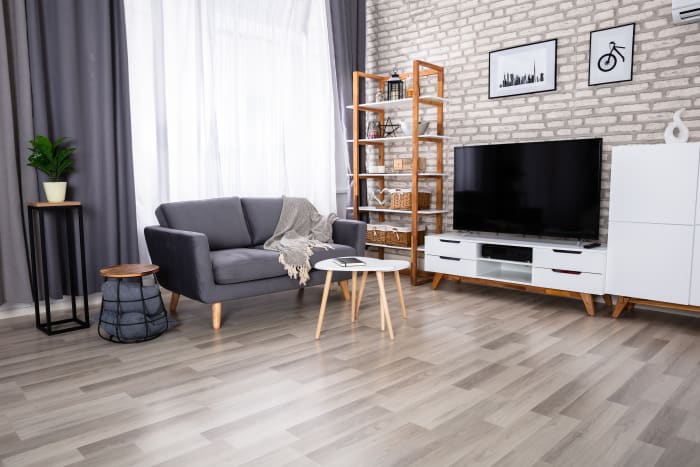Vinyl Flooring
For a floor that will look great and last a lifetime, look no further than vinyl. These floors aren’t just durable—they’re gorgeous enough to go in any room of the house.
Shop All

Popular Types of Vinyl Flooring

Luxury Vinyl Tile (LVT)
- The look of real tile with the benefits of vinyl construction
- Durable, stunning, and often waterproof
- Available in flexible and rigid-core variants

Luxury Vinyl Plank (LVP)
- A stylish wood-look appearance and texture
- Durable, versatile, and often waterproof
- Available in flexible and rigid-core variants

Waterproof Vinyl Flooring
- Heavy-duty, completely waterproof, and dependable
- Endless patterns and textures to choose from
- Great for kitchens, bathrooms, and basements
Shop By Color
Top Vinyl Brands
Vinyl Flooring For Every Room

Bathroom Vinyl Flooring
Vinyl flooring is easy to clean, making it a great choice in bathrooms.

Kitchen Vinyl Flooring
Waterproof and durable, vinyl flooring works well in kitchens.

Bedroom Vinyl Flooring
With a wide range of different looks and styles, vinyl flooring looks great in any bedroom.
Top Rated Vinyl Flooring Specialists Near You
 FeaturedOser Paint & Flooring100 Trackside Dr, Georgetown, KY 40324
FeaturedOser Paint & Flooring100 Trackside Dr, Georgetown, KY 40324 FeaturedBrough Carpets2080 N Lapeer Rd, Lapeer, MI 48446
FeaturedBrough Carpets2080 N Lapeer Rd, Lapeer, MI 48446 FeaturedMississippi Pro Design1138 Weems St, Pearl, MS 39208
FeaturedMississippi Pro Design1138 Weems St, Pearl, MS 39208Why Vinyl Flooring?
When it comes to looks, today’s vinyl flooring can go toe-to-toe with the very best hardwood and tile on the market. And thanks to its synthetic construction, it’s durable enough to stand up to anything life can throw at it.
Whether you opt for vinyl sheet, vinyl plank, or vinyl tile, you can be sure that you’re getting a floor that will last a lifetime. The vinyl plank flooring reviews are in—and they’re absolutely glowing.
Luxury Vinyl Tile (LVT) vs. Luxury Vinyl Plank (LVP)
What’s the difference between Luxury Vinyl Tile (LVT) and Luxury Vinyl Plank (LVP)? LVT is made to look and feel just like stone or ceramic tile, while LVP is made to look and feel just like real hardwood. These days, many people use these terms interchangeably. And both products are constructed from high-quality PVC.
Advantages of Vinyl Flooring
Thanks to its synthetic construction, vinyl sheet flooring is an entirely waterproof flooring material. Many types of LVT and LVP are entirely waterproof as well. And because of advances in 3D printing and embossing technology, LVT and vinyl plank flooring can be almost indistinguishable from real tile and hardwood.
Translation: vinyl flooring isn’t just one of the most durable flooring options available. It’s also endlessly versatile, and can go in any room of the house. Bathrooms, kitchens, bedrooms, you name it. There tons of amazing vinyl flooring products to choose from.
Installing Vinyl Plank Flooring or LVT
It’s easy to install vinyl plank flooring or LVT. Most products can be glued down or installed as click-together floating floors. What is a floating floor? It’s a surface that snaps together and rests on top of a subfloor instead of being attached to it. Vinyl sheet flooring, on the other hand, comes in a roll and must be glued to a subfloor or underlayment.
Whenever you feel ready to install vinyl floors in your home, make sure you speak to your local flooring experts. Experienced flooring dealers can help ensure your purchase is the right one for your space and installed correctly, allowing your new vinyl floors to last for many years.












 tile
tile

